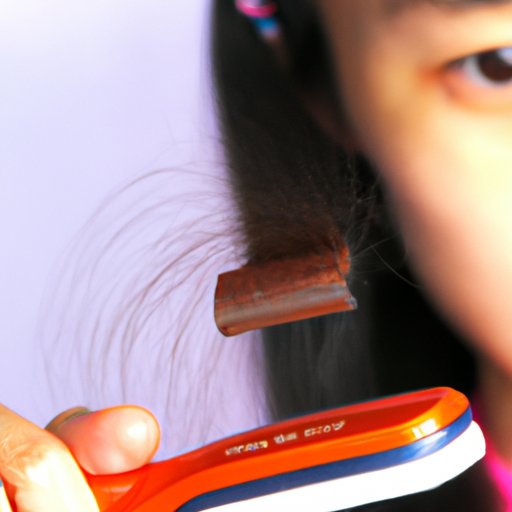Introduction
Hair loss is a common problem that affects both men and women. It can be caused by a variety of factors, such as genetics, hormones, diet, and stress. One potential cause of hair loss is low iron levels, or iron deficiency. In this article, we’ll explore the link between low iron and hair loss, examine the causes of iron deficiency-induced hair loss, and discuss ways to manage hair loss due to low iron levels.

Examining the Link Between Low Iron and Hair Loss
Iron is an essential mineral that plays a key role in many bodily functions, including the production of hemoglobin, a protein found in red blood cells that carries oxygen from the lungs to the rest of the body. When the body does not get enough iron, it can lead to iron deficiency, or anemia. Anemia can cause a variety of symptoms, including fatigue, dizziness, and hair loss.
When someone has iron deficiency-induced hair loss, their hair may become brittle and thin, and they may experience excessive shedding or patches of baldness. The hair loss usually occurs on the scalp, but it may also affect other parts of the body, such as the eyebrows and eyelashes.
Causes of Iron Deficiency-Induced Hair Loss
There are several potential causes of iron deficiency-induced hair loss. These include:
- Dietary deficiencies. A diet that is low in iron-rich foods can lead to iron deficiency and hair loss. Vegetarians and vegans, in particular, may be at risk of developing iron deficiency due to their dietary restrictions.
- Heavy menstrual bleeding. Women who have heavy periods may lose more iron than they take in, leading to iron deficiency and hair loss.
- Gastrointestinal disorders. Gastrointestinal disorders, such as celiac disease, Crohn’s disease, and ulcerative colitis, can interfere with the body’s ability to absorb iron from food, leading to iron deficiency and hair loss.
- Medications. Certain medications, such as antacids and proton pump inhibitors, can interfere with the body’s ability to absorb iron, leading to iron deficiency and hair loss.
How to Diagnose and Treat Iron Deficiency-Related Hair Loss
If you think you may have iron deficiency-induced hair loss, it’s important to talk to your doctor. Your doctor will likely order a blood test to check your iron levels. If your iron levels are low, your doctor may recommend taking an iron supplement or making dietary changes to increase your iron intake.
In some cases, your doctor may also recommend taking a multivitamin or other nutritional supplements to help replenish your body’s stores of iron. It’s important to follow your doctor’s instructions carefully and to take the recommended supplements regularly to ensure that your iron levels return to normal.
Managing Hair Loss Due to Low Iron Levels
Once you’ve been diagnosed with iron deficiency-induced hair loss, there are several steps you can take to help manage your symptoms and promote healthy hair growth.
The Effect of Low Iron on Hair Growth and Quality
Low iron levels can affect the hair follicles, causing them to become weak and unable to produce healthy hair. This can lead to thinning hair, excessive shedding, and patches of baldness. In addition, low iron levels can reduce the amount of melanin in the hair, resulting in lighter coloring.
Understanding the Role of Iron in Hair Health
Iron plays a vital role in the health of your hair. Without adequate iron, the hair follicles cannot produce healthy hair. Additionally, iron helps carry oxygen to the scalp, which is necessary for proper hair growth. Without adequate oxygen, the hair follicles may become weakened and unable to produce healthy hair.
Foods to Eat to Increase Iron Intake and Prevent Hair Loss
Eating a balanced diet that includes plenty of iron-rich foods can help replenish your body’s iron stores and prevent hair loss. Foods high in iron include beef, pork, poultry, fish, beans, lentils, spinach, kale, and fortified cereals. Additionally, Vitamin C can help your body absorb iron more efficiently, so it’s a good idea to pair iron-rich foods with foods high in Vitamin C, such as oranges, strawberries, and broccoli.
Conclusion
Hair loss is a common problem that can be caused by a variety of factors, including low iron levels. Low iron levels can affect the hair follicles, leading to thinning hair, excessive shedding, and patches of baldness. If you think you may have iron deficiency-induced hair loss, it’s important to talk to your doctor to get a diagnosis and treatment plan. Additionally, eating a balanced diet that includes plenty of iron-rich foods can help replenish your body’s iron stores and prevent hair loss.
In summary, low iron levels can cause hair loss. It’s important to talk to your doctor if you think you may have iron deficiency-induced hair loss, as this condition can be treated with iron supplements and dietary changes. Additionally, eating a balanced diet that includes plenty of iron-rich foods can help replenish your body’s iron stores and prevent hair loss.


